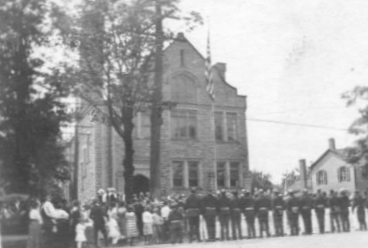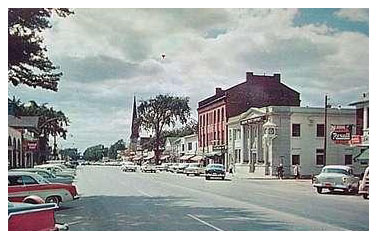Village
of Williamsville Code
Previous Chapter | Table of Contents | Next Chapter
Chapter 28: Fire
Prevention and Building Code Administration
§ 28-1. Purpose.
§ 28-2. Definitions.
§ 28-3. Administration.
§ 28-4. Duties
of enforcement officials.
§ 28-5. Building
permits.
§ 28-6. Application
for building and plumbing permits.
§ 28-7. Exceptional
development.
§ 28-8. Inspections.
§ 28-9. Stop-work
orders.
§ 28-10. Revocation
of permit.
§ 28-11. Right
of entry.
§ 28-12. Certificate
of occupancy.
§ 28-13. Certificate
of compliance.
§ 28-14. Designation
of fire limits.
§ 28-15. Smoke
detectors.
§ 28-16. Property
maintenance.
§ 28-17. Fees.
[HISTORY: Adopted by
the Board of Trustees of the Village of Williamsville 7-25-88 L.L. No.
11-1988. Amendments noted where applicable.]
General References
Demolition of building-See
Ch. 12
Unsafe and unfinished
buildings - See Ch. 15
Flood damage prevention
- See Ch. 31
Landscaping - See. Ch.
57
Signs - See Ch.
84
§ 28-1. Purpose.
This chapter shall provide
for administration and enforcement of the Uniform Code and all local laws
of the Village of Williamsville. Except as otherwise provided in this chapter
or in the Uniform Cede, all premises, regardless of use, are subject to
the provisions which follow.
§ 28-2. Definitions.
As used in this chapter,
the following terms derived from the Uniform Code shall have the meanings
indicated:
ADDITION - Extension
or increase in area, height or equipment of a building.
ALTERATION - Any change,
rearrangement or addition to a building, other than repairs, or any modification
in construction or in building equipment.
BUILDING - A structure
wholly or partially enclosed within exterior walls, or within exterior
and party walls, and a roof.
CONSTRUCTION - Includes
all the on-site work done in building or altering structures, from land
clearance through completion, including excavation, erection and the assembly
and installation of components and equipment.
CONVERSION - A change
in the use of a building to another use which has different requirements
according to the Uniform Code.
EQUIPMENT - Includes
plumbing, heating, electrical, ventilating, air conditioning, refrigerating,
elevators, dumbwaiters escalators and other mechanical additions or installations.
FIRE LIMITS - Boundary
line establishing an area in which there exists or is likely to exist a
fire hazard requiring special fire protection.
REPAIR - Replacement
or renewal (excluding additions) of any part of a building, structure,
device or equipment with like or similar materials or parts for the purpose
of maintenance, preservation or restoration of such building, structure,
device or equipment.
UNIFORM CODE - New York
State Uniform Fire Prevention and Building Code.
§ 28-3. Administration.
A. [Amended 7-24-89 as L.L.
No. 2-1989] There are hereby established the designations of Code Enforcement
Official and Fire Safety Official.
(1) The Building Inspector
and/or the Building and Zoning Clerk are each hereby designated as a Code
Enforcement Official and shall be possessed of all the powers and duties
of said office whether acting individually or jointly.
(2) The Fire Inspector
is hereby designated as the Fire Safety Official.
B. Each Official shall
be appointed by the Board of Trustees at a compensation to be fixed by
said Board. Where the Code Enforcement Official and/or Fire Safety Official
is for any reason unable to act. the Mayor shall designate. with the approval
of the Board of Trustees, a person to act for either or both of these Officials.
C. A schedule of fees
for all permits and certificates shall be established by resolution of
the Board of Trustees.
D. The Code Enforcement
Official, Fire Safety Official, Superintendent of Public Works or Fire
Chief shall each have the power to issue a summons to any person or persons
in connection with a violation of the Uniform Code or any local law. If
an incumbent Fire Chief does not possess the necessary qualifications to
act as a Code Enforcement Official, another qualified individual recommended
by the Fire Chief shall he designated by the resolution of the Village
Board. [Amended &25-1990 by L.L. No. 11-1990; &24-1991 by L.L No.
5-1991]
§ 28-4. Duties of enforcement
officials.
The Code Enforcement Official
and Fire Safety Official shall administer and enforce all of the provisions
of the Uniform Code and all local laws.
§ 28-5. Building permits.
A. It shall be unlawful
to erect, construct, enlarge, alter, improve, remove, demolish or convert
any building, structure or portion thereof or install equipment therein
without first having secured a permit.
B. It shall be unlawful
to commence the construction or enlargement of any off-street parking facility
without having first secured a permit.
C. The following shall
not require a permit:
(1) Necessary repairs
which do not materially affect the structural features of a building.
(2) Alterations to existing
buildings, provided that the alterations:
(a) Cost less than ten
thousand dollars ($10,000.);
(b) Do not materially
affect structural features; and
(c) Do not affect fire
safety features, including but not limited to smoke detectors, sprinklers,
required fire separations and exits.
D. All electrical work
shall be inspect by the New York Board of Fire Underwriters or Atlantic-Inland.
§ 28-6. Application
for building and plumbing permits.
A. Application for building
and/or plumbing permits shall be made to the Building Department in such
form and accompanied by such materials as required by the Building Department.
B. An application for
a permit shall be accompanied by payment of a permit fee, which shall be
nonrefundable.
C. A permit for development
in flood hazard areas shall be required if the proposed construction or
any other development is within the area of special flood hazard as identified
by the Federal Emergency Management Agency (FEMA) as set out in Chapter
31 of the Village Code.
D. Any project the floor
area of which exceeds one thousand five hundred (1,500) square feet and/or
which costs twenty thousand dollars ($20,000.) or more shall require sealed
drawings from a licensed architect or engineer.
E. A modification, if
any, to the plans and specifications shall be filed with the Building Department
and approval of the Code Enforcement Official shall be secured prior to
the commencement of work under said modification.
F. A permit issued pursuant
to this section for all work shall expire one (1) year from the date of
issuance and, on written request, may be renewed for successive one-year
periods.
§ 28-7. Exceptional
development
A. The Board of Trustees
shall hear and decide any application for a special permit, to be known
as an "exceptional development permit," for those proposed uses as herein
set forth.
B. Any proposed construction
or use requiring an exceptional development permit is declared to such
unique and special characteristics as to require consideration by the Board
of Trustees on an individual basis.
C. Exceptional development
procedure shall be required when the proposed construction or use involves:
(1) Any multiple dwelling
consisting of four (4) or more dwelling units.
(2) Gross floor area
in excess of ten thousand (10,000) square feet.
(3) Any building, the
highest point of which exceeds a height of thirty (30) feet, measured from
the finished grade of the street on which the building fronts.
(4) Any proposed residential
subdivision providing ultimately for three (3) or more detached residential
units.
D. Procedure. The Board
of Trustees may grant an exceptional development permit only after the
following procedure has been completed:
(1) A request in writing,
accompanied by nay plans and specifications as required by the Building
Department.
(2) The matter shall
be referred to the following committees and each committee shall submit,
in writing, its recommendations to the Building Department:
(a) Planning/Architectural
Review Board.
(b) Traffic and Safety
Committee.
(c) Environmental Advisory
Council.
(d) Recreation Committee.
(3) The Board of Trustees
shall thereafter set a date for a public hearing in the matter and the
Village Clerk shall give public notice thereof by publication in the official
paper of the village at least fifteen (15) days prior to the date of such
hearing.
(4) All advisory recommendations
shall be attached to the minutes of the public hearing.
(5) The Board of Trustees
shall make findings of fact supported by substantial evidence in the record
to disclose the basis of its decision.
E. The Board of Trustees
shall grant an exceptional development permit only upon a finding of reasonable
grounds to believe such action will promote the public health, safety and
welfare of the residents of the village.
F. Except in those cases
where the proposed construction or use is prohibited in the zoning district
where the property is located, the Board of Trustees may waive any requirement
of the Zoning Chapter when it grants an exceptional development permit,
but only upon detailed findings of fact, to be set forth in the minutes
of the meeting, and a declaration that said waiver will promote public
health, safety and welfare of the residents of the village.
G. The Board of Trustees,
in granting an exceptional development permit, may impose reasonable conditions
on the proposed construction or use beyond those specified in the Village
Code in order to protect and promote the public health, safety and welfare
of the residents of the village.
H. Notwithstanding any
provision to the contrary in the Village Code, a decision of the Board
of shall be reviewable only in a ping under Article 78 of the Civil Practice
Law and Rules.
§ 28-8. Inspections.
A. Any construction for
which a building permit has been issued shall be inspected and approved
by the Code Enforcement Official prior to enclosing or covering at each
of the following of construction.
(1) Footing inspection:
before concrete is poured or block set
(2) Framing inspection:
before insulation, plumbing and electric are installed.
(3) Rough plumbing inspection.
(4) Electrical inspection
(inspected by New York Board of Fire Underwriters or Atlantic-Inland, Inc.).
(5) Insulation inspection:
floors, walls, ceilings, etc.
(6) Final inspection:
after completion of all work, including gutters, downspouts, siding, plumbing,
electrical, etc.
B. Existing commercial
and manufacturing buildings shall be subject to periodic inspections by
designated agents of the village in order to ensure compliance with the
Uniform Code.
C. Inspections may be
conducted at the invitation of an owner/occupant or where it is alleged
that conditions on the premises threaten or present a hazard to the public
health, safety or welfare.
D. All solid fuel burning
appliances shall be inspected by designated agents of the village upon
installation and prior to use to assure compliance with the Uniform Code
and manufacturers' specifications.
E. Fire and safety inspections
shall be conducted as follows:
(1) All multiple dwellings
and all nonresidential occupancies shall be inspected for compliance with
the Uniform Code.
(2) Places of public
assembly, as defined by the Uniform Code.
(3) Any building damaged
by fire.
§ 28-9. Stop-work orders.
A. The Code Enforcement
Official may order any construction under a permit to stop where there
exists a violation of plans, specifications or applicable laws or an unsafe
or unsanitary condition at the construction site.
Previous Chapter | TOP | Table of Contents | Next Chapter

|
A picture of 5583 Main St Village Hall pictured in 1949 was originally built with limestone mined from the Young's limestone quarry which occupied what is now The Country Club of Buffalo. click here to see a bigger picture.
|

|
A picture of Main St looking West taken in 1950. The Ronecker building on the right is now home to Marty's formal wear. Picture courtesy of Dan Crapsi. click here to see a bigger picture.
|
Click Here to see more pictures
 |
 |



